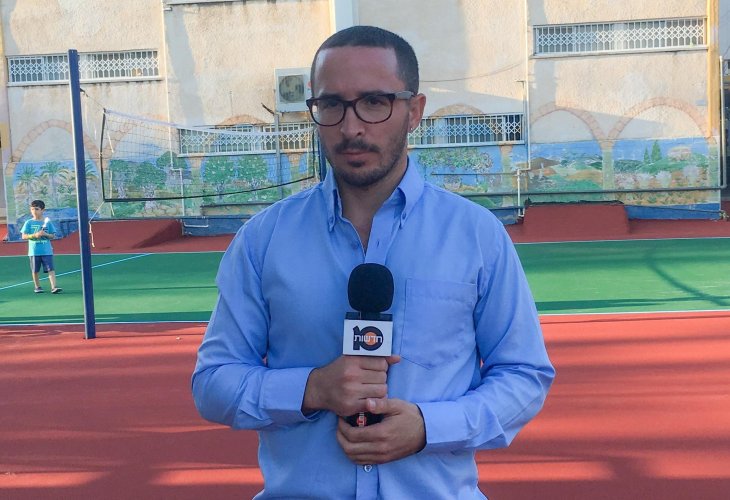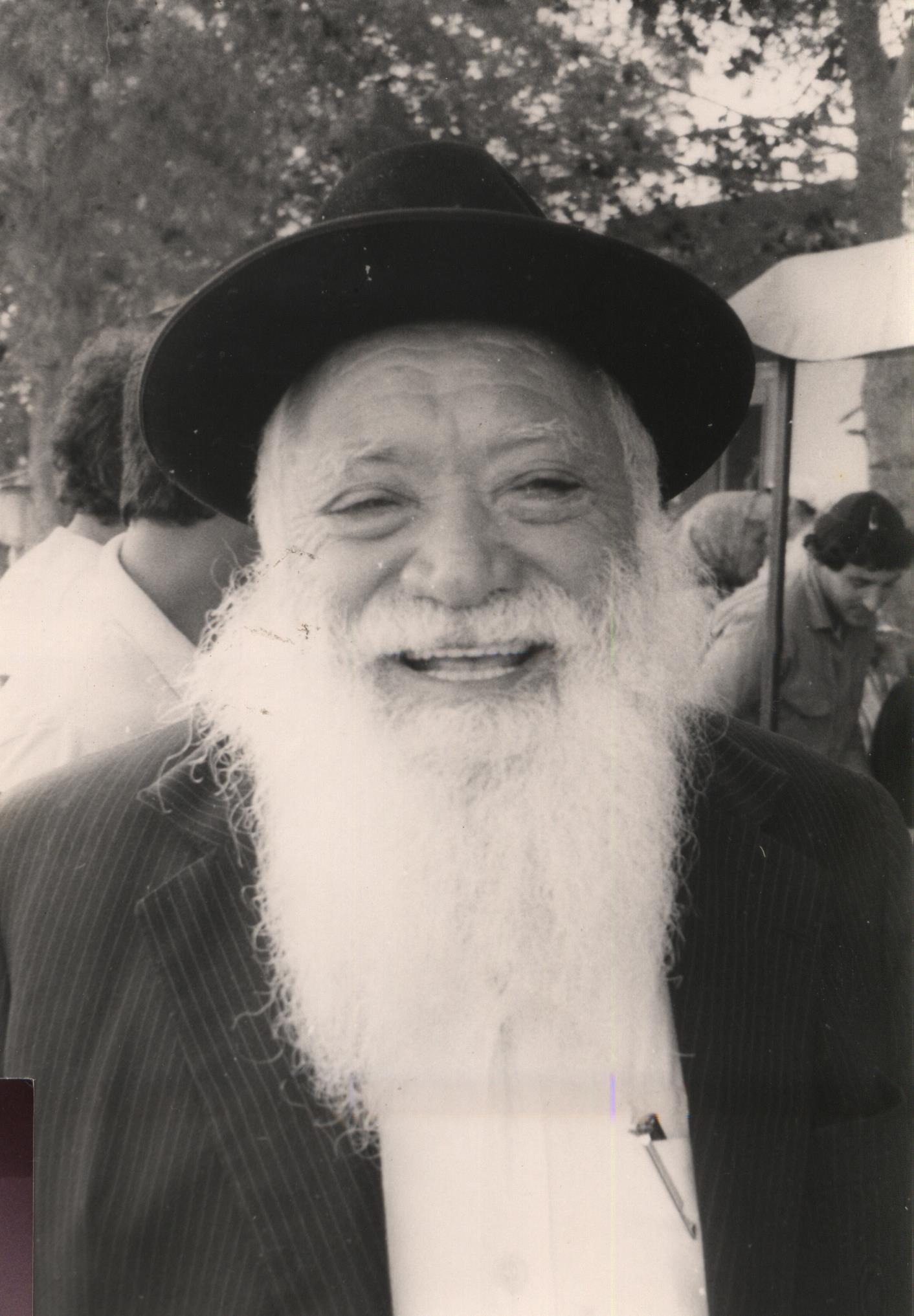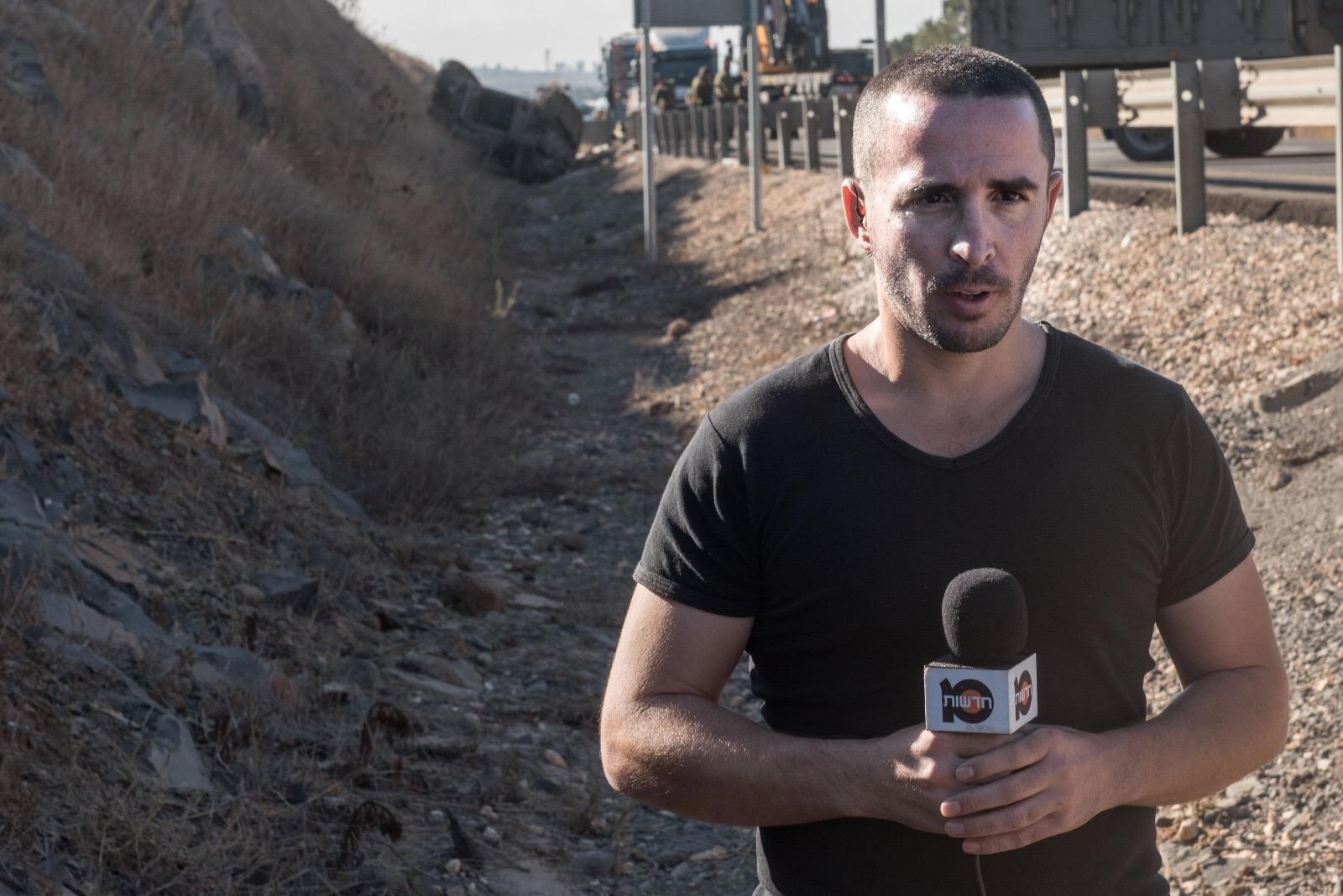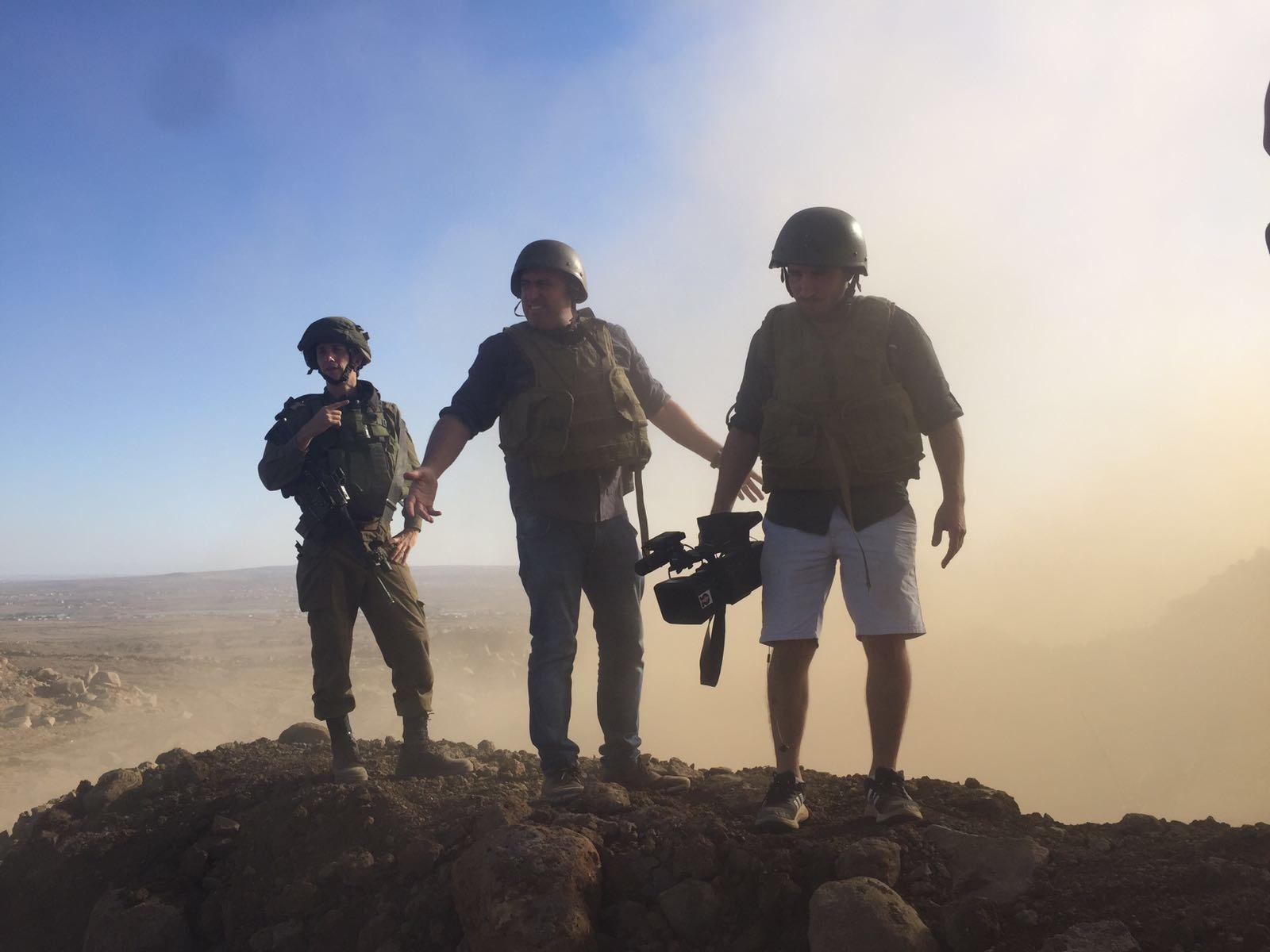"And Then, Amidst the Crying, I Saw My Grandfather Who Had Passed Away"
Gilad Shushan and his wife were on a ferry in Thailand that capsized off the coast of Ko Phi Phi. They were thrown into the water and feared there was no chance of rescue, but then a lifebuoy was thrown their way. In an emotional conversation, Gilad recalled those moments: "Suddenly I saw my late grandfather on the ship. I'm sure it was the merit of my ancestors that saved me."
 Gilad Shushan
Gilad ShushanGilad Shushan is a photographer and reporter for Channel 10. Through his work, he has covered many accidents and various events, but he never imagined he would find himself at the center of a terrifying drama. He didn't foresee that this experience would change his outlook on the world and lead to a change in his life.
"My story actually begins when I was a child," he notes, "I grew up in a traditional family, with two very religious grandfathers. I had a close relationship with one grandpa because he lived near my parents' home in Kiryat Shmona, where I was also raised. Grandpa came from Morocco and established a synagogue in Kiryat Shmona where he prayed regularly, even during the Katyusha attacks and wars that plagued the city.
Grandpa was known as a great tzaddik; every time I went to his house, I saw him studying. I know many people used to visit him often to receive blessings. One day, when a fire broke out in the synagogue, Grandpa jumped into the flames to save the Torah scrolls. Today, the synagogue still stands and is named after him – 'Havurat Shalom' in honor of Rabbi Yaakov Shushan.
When I was twelve," Gilad recounts, "Grandpa was already very old, confined to a wheelchair, and I, as the eldest grandson, was tasked with taking him to the synagogue every Shabbat morning. This meant I had to be at his house every Friday evening from six o'clock.
At that time," he recalls, "it really annoyed me – after all, it was Friday, and I wanted to be with friends, and even on Shabbat morning – I didn't want to wake up early to go to synagogue. I did it because I had no choice, but looking back, I now know it was a great privilege, and it undoubtedly impacted me deeply."
 Grandfather Rabbi Yaakov Shushan of blessed memory
Grandfather Rabbi Yaakov Shushan of blessed memorySuddenly, I Saw Grandpa
As the years passed, in his adulthood, Gilad notes that he rejected all of it. "Although our home wasn't religious, there was much tradition, but I felt I didn't believe in anything, I was an atheist, and unfortunately, I didn't even observe Yom Kippur."
The significant and unforgettable event in his life occurred about ten years ago when he and his wife flew to Thailand with friends - Nissim and Odelia, who were on their honeymoon.
During the trip, we boarded a ferry departing Ko Phi Phi for another southern island in Thailand. About ten minutes after setting sail, around Maya Beach, heavy rains started pouring down, and the sea became rough. Within a minute, we felt water entering the ship, the anchor fell, and it began to sink.
My wife and I were on the lower deck," he adds, "while Nissim and his wife were on the upper deck. Suddenly, a big wave flipped the ship. At that moment, I realized the best thing to do was to jump into the water, so I remember kicking my wife with all my strength to push her to the stern of the ship, above the windows of the engine room that were spewing smoke, and then we jumped together into the sea. The person who jumped after us was Adam Beriditschevsky, who unfortunately was seriously injured by the ship's engine. Today, he is a top athlete who competed in the Olympics.
We found ourselves in the sea, knowing all our passports, money, and cameras brought because of my photography career were left on the ship, and the only things we had were the life jackets. That, too, was a big miracle, because just minutes before the ship sank, my wife insisted on putting on the jackets. We were almost the only ones with life jackets.
We swam in the water with giant waves almost drowning us. I dog-paddled and felt my strength fading."
In those moments, Gilad says he was close to his wife, but they didn't know what happened to their friends, so they shouted while swimming: "Nissim! Odelia!" "But eventually, we realized there was no way to help them while we were also in life-threatening danger."
Their rescue mission was complex because near the ship's sinking point were cliffs with sharp coral reefs. The engine room of the ship started burning, and they had to distance themselves from the dangerous areas and the massive storm waves that even the life jackets could barely withstand.
 (photo: Eyal Margolin-Gini)
(photo: Eyal Margolin-Gini)What Goes Through One's Mind in Such Moments
In the first seconds when the ship sank, and we were on the lower deck, I thought I didn't stand a chance. I felt just like in Titanic; everywhere I looked, I saw people falling off the ship and diving like fish in the water, trying to flee and escape.
Even when we were in the water, I felt we were on the brink of death because objects from the ship fell on us from all sides – bags, oxygen tanks, and even a refrigerator. I remember that while swimming, we covered our faces with our hands, fearing something might hit us.
The first moment I realized there was hope was when I noticed a speedboat full of tourists passing near us. One of the crew tried to throw us a lifebuoy. We were 300 meters away, but he was afraid to get closer because it was a serious storm, and there is a known current when a ship sinks. He tried throwing it several times, and we couldn’t catch it. The last time he signaled us he couldn’t do it anymore. We shouted and pleaded; I don’t know if he heard us, but he threw it again, and then I caught the ring at the last moment by the rope tied around it, we hung onto it together, and he pulled us to the boat.
My wife went up first, and then I did. It was, as mentioned, a period when I no longer ate kosher or believed in anything, but the moment I got on the boat, I screamed hoarsely: 'Shema Yisrael' and cried."
Gilad's voice shakes as he recalls those harrowing moments: "Suddenly, in the midst of the shouting, I saw my late grandfather on the boat, with his white hair and blue eyes. When I saw him, I understood it wasn’t by chance that I survived. The merit of my ancestors stood for me. I remember the surprised look on my wife’s face when I shouted 'Shema Yisrael'."
It was an unusual situation – we were wet and dripping, the Thais around brought us towels, and all the tourists on the boat were worried for us, and I was clutching my head and crying, not for myself and because we survived, but because I saw grandpa. My grandpa."
I Wouldn’t Leave Nissim
In fact, there was also a big miracle with the ferry's sinking, as Gilad points out – all the other Israelis on board, except one, were saved. "The only one killed was Nissim, our good friend. It was truly a great tragedy, but initially, we still didn’t know about it. When we got to the shore, we saw that there were already other Israelis rescued. We immediately gathered and tried to make a list to check if anyone was missing. We didn’t know each other, so we wrote based on memory – the girl with the cast on her hand, the couple with the kid, the pair of tourists from China. Everyone contributed the names they remembered, and when they arrived, we ticked them off and breathed a sigh of relief.
In the meantime, I took it upon myself to inform the embassy about the sinking. I went to a nearby hotel and asked to speak with the embassy. I called, and one of the Thais answered. I said: 'Hello, my name is Gilad Shushan, I am the nephew of someone who worked at the embassy in Thailand in the past'. I mentioned my uncle to show I was serious and truthful. Then I added: 'We were on a ferry, around 40 Israelis, and we sank. There are some whose condition we do not know'. At that moment, the embassy began to handle the issue.
I returned to the shore," he continues, "and saw that they were treating Adam Beriditschevsky, who was seriously injured, loading him onto a boat and taking him to the hospital. Then I returned to the friend compiling the list and asked what about Nissim and Odelia. He told me that Odelia arrived, but Nissim perished. That was a very hard moment. At that time, rescue forces also arrived and asked to evacuate us to the hospital, but I refused. I felt I had to take responsibility and ensure Nissim’s body was evacuated respectfully and that everything possible was done to save him.
I have a good friend since the accident," he adds, "his name is Idan Tsitsi (Tzadok), he is Israeli but a regular traveler in Thailand. Idan heard about the incident and suddenly appeared beside me, and in an intuitive moment, he grabbed the stretcher with Nissim’s body and told the Thais: 'You are not taking him anywhere without his wife and friends coming'. Idan understood that it was not possible for a few Thais to accompany Nissim on his final journey. Now I realize he performed a tremendous mitzvah, true loving-kindness. Then he gave me a torn Tehillim book and told me: 'Read Psalms'.
So, Gilad found himself once more, shedding his atheist facade, reading Tehillim with tears throughout the drive. "I still keep that Tehillim book with me," he notes.
 Combat photo during cross-border coverage in Syria with Eli Levy, Channel 10 reporter
Combat photo during cross-border coverage in Syria with Eli Levy, Channel 10 reporterIt Wasn’t a Hallucination
Only after Nissim arrived at the embassy did Gilad allow the rescue forces to also evacuate him and his wife to the hospital, where they underwent tests for two days. "Most of the travelers, as we learned, decided to continue their travels in Thailand, but we wanted to return to Israel to of course attend the funeral.
We returned to Israel," he concludes, "and my perspective on life changed. I kept asking myself over and over what happened to me when I was in those moments on the ship. I knew I was generally a sober person and didn’t understand what happened within me. While still on the boat, I told my wife that I saw my grandpa and asked her if she thought I’d gone crazy. She was shocked, because it was a time in my life when I didn’t believe at all. Over the years that have passed since, I’ve tried to clarify to myself whether these things really happened and I am certain, it wasn’t a hallucination, it was real, my grandpa was truly on the boat and protected me.
Today, Gilad defines himself as being in a process of 'striving'. "Not many know, but I pray three times a day alone, try to visit the synagogue when possible, keep kosher, and am always in a process of advancement. For several years now, I’ve been listening to Rabbi Zamir Cohen’s CDs in the car and really connect with him personally."
He also adds: "Despite what happened in Thailand, I returned there several times, although it was mentally tough. I even took my little daughters on one of the trips. It is certainly a corrective experience, but I couldn’t bring myself to return to that specific beach in Ko Phi Phi. It’s mentally hard for me to go to that place."

